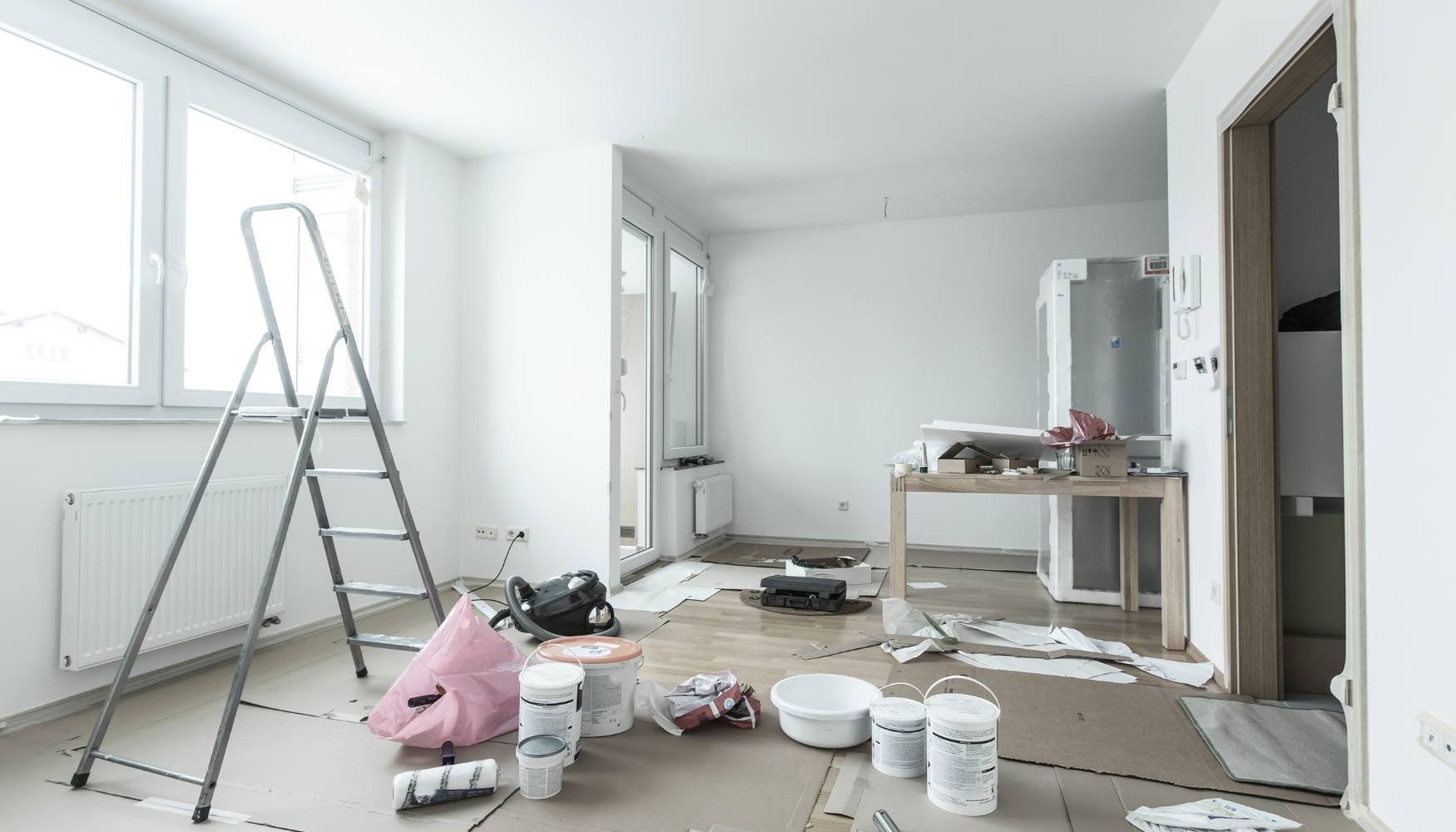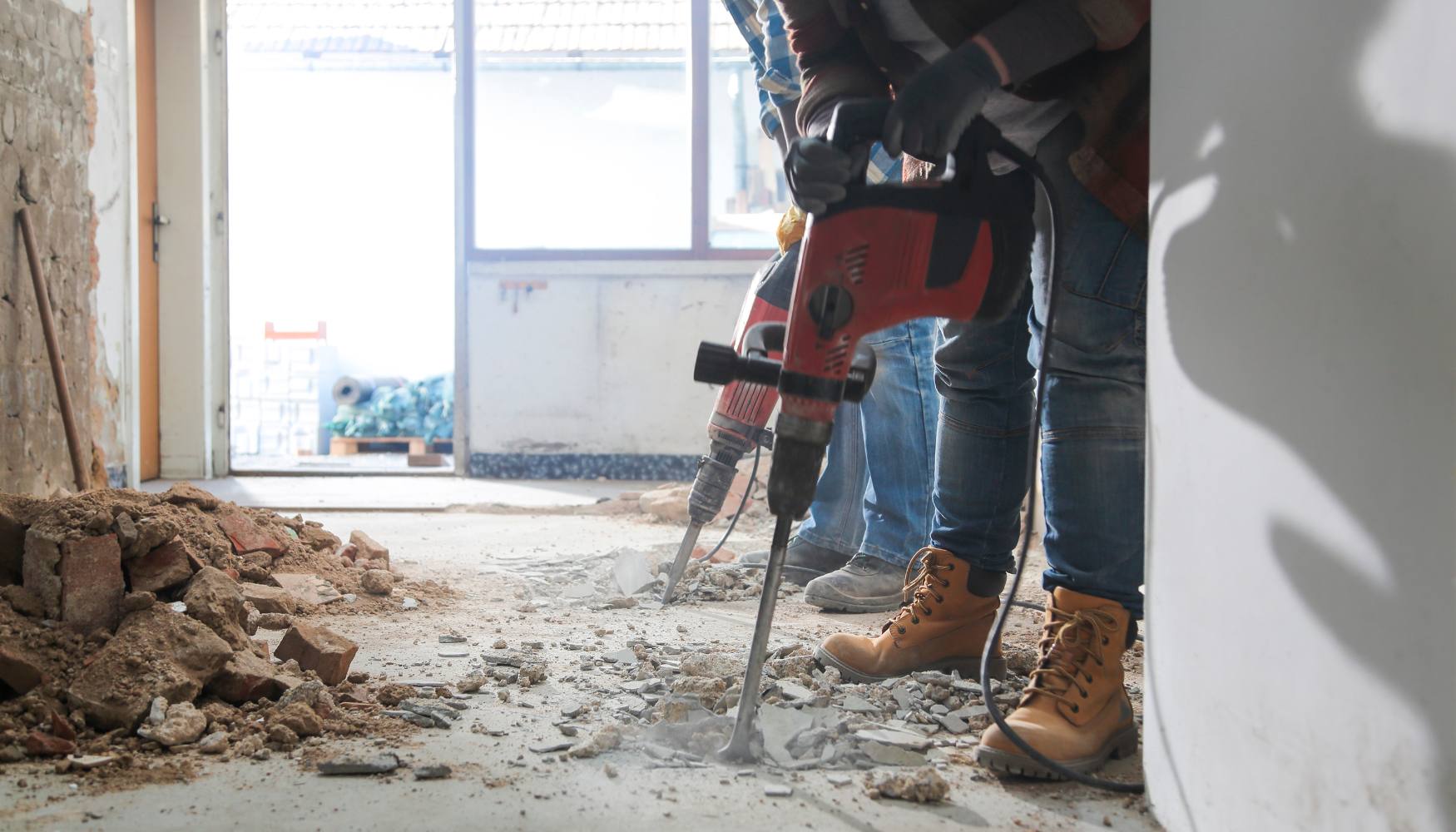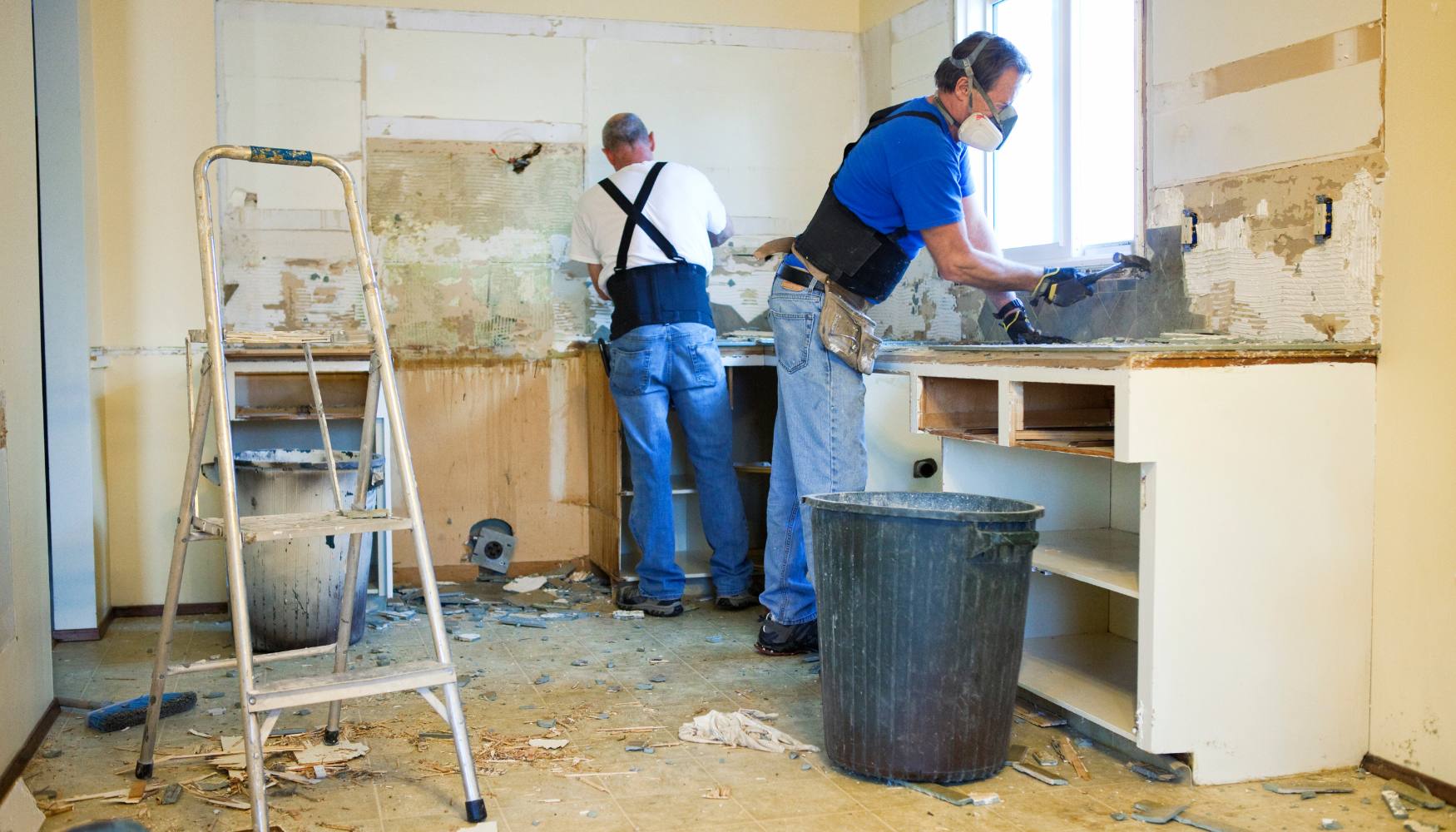You have arrived home to find a small swimming hole where your basement used to be. Something in your house has leaked, burst, or overflowed.
Your first thought? I knew I should have extended my vacation by a couple of days.
Your mind then shifts to panic and disbelief.
Your second thought: How am I going to get my insurance to pay for this?
Understanding home insurance for renovations can be a lot like trying to comprehend what Charlie Brown’s teacher is trying to say — it can be confusing and incredibly unclear.
Keep reading as we filter through what you need to know about home insurance before you get started on your renovation.
Table of Contents
- Can You Use Home Insurance To Cover Repairs and Remodeling?
- Home Insurance During Renovations: What You Should Know Before Getting Started
- Policy Changes To Consider Before You Begin
- Pure Environmental: Professional Home Restoration and Repairs Tailored to Your Needs
Can You Use Home Insurance To Cover Repairs and Remodeling?
Yes, you can! However, what and how much will be covered will vary based on your policy.
As a rule of thumb, when renovating your home, it’s a good time to review your homeowner’s insurance limits.
Even if you don’t use insurance during renovations, you should still make your insurance carrier aware of your upgrades. Your coverage might need to change.
According to the Hanover 2023 home renovation report, one-third of homeowners who made major renovations didn’t let insurance know about their upgrades and 34% said they didn’t know that they should.
When you make improvements but fail to notify your insurance, you boost your home’s value but open yourself up to uninsured losses.
For example, if you created an addition and there’s a house fire, insurance should know so they can up your coverage and increase the amount of money for you to rebuild. On the flip side, if you upgrade wiring or plumbing during your renovation, it may lower your premium because you have reduced risk to your home.
In any case, experienced restoration experts, like Pure Environmental, can work with your insurance adjuster to make sure your best interests are served.
What Does Home Insurance Cover?
It all depends on your insurance and your specific policy,
Generally speaking, if you’re renovating your home or making repairs because of damage, home insurance often provides coverage.
Dwelling coverage is part of a homeowner’s insurance policy that protects against damages to the physical structure of your home in the event of unforeseen accidental damage resulting from a covered peril.
Here are some examples of perils that may be covered depending on your specific insurance policy:
- Fire
- Lightning
- Windstorm or hail
- Explosion
- Smoke
- Vandalism
- Accidental water damage
- Freezing of plumbing
- Weight of ice and snow
Your insurance might provide coverage for minor renovations such as painting or replacing floors prior to a covered loss.
But if you’re looking to remodel or renovate larger projects like upgrading your kitchen, adding on, installing a pool, etc., you may need to update your policy to get the coverage you need.

Home Insurance During Renovations: What You Should Know Before Getting Started
Use a Contractor That Can Work With Your Insurance Company
Insurance is downright confusing — not only does it have its own language but the series of requirements and detailed line items can leave you feeling quite overwhelmed.
How can you trust that your insurance adjuster is doing everything they can to help you? How do you know if you accurately understand your policy as it is written?
Contractors are experienced in working with insurance companies and adjusters.
Here are some ways that a trusted contractor can help you with your home insurance for renovations:
- They provide knowledgeable representation.
- They make sure you actually have compensable damage.
- They are familiar with local ordinances and building codes.
- They understand how to effectively justify your claim to your insurance company.
- They can negotiate to get as much value from the claim as possible.
A dependable contractor will be insured. This means that should any damage happen during the renovation, you are assured that your contractor will take responsibility for it.
At Pure Environmental, we speak your insurance provider’s language. No more second-guessing when it comes to home renovation and insurance.
Our experienced team will:
- Survey your damage
- Give you an estimate for repairs or remodeling services
- Work with your insurance company to quickly provide you with a quality restoration
Let Pure Environmental represent you so you’re not paying more out-of-pocket than you need to.
Know What Will Likely Be Covered and What You Might Have To Pay Out-of-Pocket
Cause of Damage
Part of your homeowner policy pays to repair or rebuild your home if a covered risk damages your home. However, the cause of damage is typically not covered by insurance.
For example, if your pipe bursts and ruins your kitchen floor, your home insurance will cover the cost of replacing your damaged floor. But, they will most likely not cover the cost of the plumber and the plumbing repair.
However, if a freeze causes your pipe to burst which then damages your floor, insurance should cover the plumber, the plumbing repair, and the new floors because the weather was the cause of the damage, not faulty plumbing.
Feels like you have just solved a home insurance riddle, right?
Keep in mind that what will be covered and not covered due to the cause of damage is dependent on your specific policy and can vary.
This is all the more reason to acquire guidance from a professional restoration contractor who is experienced in solving these riddles.
Additional Living Expenses
If you are temporarily displaced from your home because of the damage or need to be out of your home during renovations, insurance will typically pay for additional living expenses (ALE).
For instance, if a fire, windstorm, or severe mold issue leaves your home unfit to live in and you need to relocate for a few months while it’s repaired, ALE coverage may help pay for costs that exceed your typical expenses. It’s important to fully understand your coverage though, because many policies do not cover or have very limited mold coverage.
Depending on your ALE policy, a few examples that might be covered include:
- Hotel stays
- Meals
- Storage fees
- Rental car
- Pet boarding
- Additional fuel costs
If particular additional living expenses are covered, know that you will be reimbursed by your insurance after making these purchases.
A word to the wise — be sure to be reasonable with your choices and save your receipts. Choosing steak and lobster at a Michelin-star restaurant may not be the best meal choice when justifying these expenses to your insurance company.
Difference in Power Bill
If your renovation requires large equipment that eats up a lot of your electricity — like large dryers for water damage — you can submit the difference in your power bill for reimbursement.
It may or may not be covered by your home insurance for renovations, and sometimes it isn’t worth the hassle, but know that it could be an option.

Policy Changes To Consider Before You Begin
Before you start, speak with your insurance agent to see if your existing policy should be updated — they’ll need details of your renovation to determine this.
Information your agent may ask for to determine if added coverage may be needed:
- Type of renovation being made
- Square footage that will be added to the home
- Materials being used
- Cost of materials
Increase Insurance Coverage
Any renovation that increases your home’s rebuilding costs could leave you underinsured after the renovation.
Here’s an example. If your home has $200,000 in dwelling coverage, that’s the amount that your insurance will pay toward rebuilding your house for a covered loss (minus your deductible).
Seeing this as an opportunity to build your dream kitchen, you decide to upgrade with high-end materials and add some square footage. It looks fabulous, but with these updates, your rebuilding costs are now $280,000.
If you don’t update your policy, you may end up regretfully underinsured. In this scenario, your policy would pay only $200,000 of the $280,000 rebuilding costs, and the rest would come out of your pocket.
Keep in mind that you must be prepared to forward your records and receipts to your insurance company so it can accurately assess your insurance needs. It’s important to take photos before, during, and after renovation so you have a visual record of the project as well.
Increase Liability Coverage
You may want to consider increasing your liability coverage limits during the period of renovation in case there is a makeover mishap or someone who doesn’t live with you gets injured.
That way, if someone does get injured on the job, they can submit their medical bills directly to your insurance company. Increasing your liability coverage may also lessen your chances of being sued if someone does get hurt.
You might want to continue your increased liability coverage even after your renovation if it includes an attractive nuisance or something that creates a potentially dangerous condition.
Here are some attractive nuisance examples:
- Swimming pools
- Hot tubs
- Fountains
- Landscaping
- Playground equipment
Increase Personal Possession Coverage
If you purchase any expensive items as part of your renovation, you may need to boost your personal property coverage limits.
Let’s say you build an addition to display a collection of your newfound passion, art nouveau, and you add to your art collection with new pieces to fill the space.
Any new, valuable items might need additional coverage.
One good way to insure your artwork can be to purchase a scheduled personal property endorsement.
This add-on policy allows for an increase for specific items, like your new art collection. Purchasing an endorsement can raise the premium but results in a higher payout after a covered loss.
Add Dwelling Under Renovation Coverage
Dwelling under renovation insurance protects the building materials at, or on the way to, your property.
In cases where materials get damaged or even stolen from the job site, this endorsement policy can protect you during the shortfalls that may occur during the construction processes.
Adding this endorsement to your home insurance during renovations can help with:
- Soft costs – Interest on the work loan, licensing and permit fees, or any other cost that may arise from a project’s postponement
- Building materials and supplies – Any tools, equipment, or building materials that are used for construction at, or en route to, the covered house
- Covering the dwelling’s physical structure – Like a foundation collapse
Remember, to guarantee coverage, a licensed restoration expert must complete the construction work; otherwise, any claims might be rejected.

Add Vacant Home Coverage
Depending on your renovation, you may be unable to live at your home while it’s under construction. If you’ll be away from your home for more than 60 days, you might consider adding vacant home insurance coverage.
A vacant home represents a higher risk to insurance companies than a home that is occupied full-time.
With no one to keep an eye on your property 24/7, it has a higher chance of being damaged due to vandalism or other shenanigans. If damage occurs and goes unnoticed for a while, you may still be protected under the addition of vacant home coverage.
Pure Environmental: Professional Home Restoration and Repairs Tailored to Your Needs
The team at Pure Environmental knows you have choices when it comes to selecting a company that can help you repair and remodel your space.
So, what sets us above the rest?
- Dealing with insurance is confusing — costs change depending on your zip code, line items are assigned values using coding software, and insurance contracts are dense and complex. We speak their language and can effectively interpret for you.
- Traditional remodeling contractors don’t have the skills or experience to negotiate with insurance companies for restoration projects. We do! And it can save you from paying more out of your pocket.
- Insurance adjusters care mostly about making a justified decision on what and why they pay out claims. We understand what documentation is needed to justify their decisions. Insurance adjusters feel confident when working with us, knowing that they are covered if and when they get audited.
- We strive for excellence and timely solutions. Our environmentally friendly approach and innovative technologies allow us to repair your home safely and efficiently.
Let us work with your insurance adjuster, save you time and out-of-pocket money, and restore your home to life.
Recent posts
- Advice From the Pros: How To Hire a Contractor for Home Renovations
- After the Fire: What To Expect From Smoke Damage Restoration Services
- Home Insurance During Renovations: What Is Covered and What To Know Before Getting Started
- Mitigation and Restoration: Understanding the Difference Between the Two and Why They’re Both Necessary
- Should You Stay or Should You Go? Know When To Walk Away From a House With Mold
